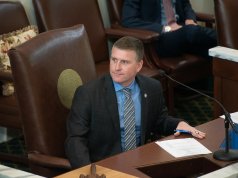
As of late Thursday afternoon, 320 candidates had filed for offices in Oklahoma. Among them are 14 registered independents and six members of the state’s new Libertarian Party.
If that doesn’t make state leaders recognize the intense desire for change across Oklahoma, they’re not paying attention.
That said, here are some WTF and FTW bills for the week.
WTF: Plates on file
On Thursday, the House passed SB 1144, which creates the Automatic License Plate Reader Privacy Act, by a vote of 51 to 27. If signed into law, the mildly contested bill would allow law enforcement to use automatic license plate readers (ALPRs) to scan license plates for offenses ranging from parking violations to ongoing criminal investigations.
Although the measure stipulates that data collected through ALPRs is not public record, at least one city has failed to keep a lid on its ALPR data. In 2015, Philadelphia-based journalist Kenneth Lipp discovered the Boston Transportation Department was keeping that city’s ALPR data on a public-facing, non-password-protected server that anyone with a web connection could access.
For a state facing as many problems as Oklahoma is currently, let’s hope law enforcement can afford a copy of Network Security for Dummies.
FTW: Autism bill passes Senate, returns to House
Also Thursday, the Senate approved (with a vote of 35 to five) a prospective new law that seeks to extend insurance coverage to autistic children under 9 years old. Under HB 2962, screenings, diagnoses and treatment of autism spectrum disorder are included as well as access to applied behavior analysis for up to 25 hours a week, with a cap of $25,000 a year. If premiums increase by more than 1 percent, the mandate would terminate.
The Centers for Disease Control and Prevention reports one in 68 children nationwide can be identified as autistic. Meanwhile, “Oklahoma is one of only seven states that doesn’t require insurance companies to cover treatment for children with autism,” according to a Senate press release Thursday.
The measure now returns to the House of Representative for further consideration.
FTW: Safe Driving Act
Last, something we can all agree on: Teenagers spend way too much time on their phones. To that end, HB 2298 passed the Senate 43 to 0 in hopes of creating the Safe Driving Act. If signed into law, the measure would require driver’s ed classes to include sections on the dangers of texting while driving in addition to education concerning driving under the influence.
Missed bits from last week
- On April 6, a Senate rules committee advanced HB 3098, commonly referred to as “constitutional carry.” If signed into law, the only significant restrictions against openly carrying a firearm in public would be an age limit (21) and a lack of felony convictions. No license would be needed to open-carry, but concealed-carry would still require one. Specific restrictions would still bar the carrying of firearms into certain designated places (government buildings, schools, etc.). The bill is active, but title has been stricken, meaning it might go to a conference committee and reappear in a different form.
- Also April 6, if you thought the farce regarding the 10 Commandments monument on Capitol grounds was over, think again. House and Senate rules committees voted to send HJR 1062 to a vote in the full chambers. If passed, the resolution would ask voters if they would like to repeal the Blaine Amendment in Oklahoma’s Constitution, thereby allowing the “use of public monies or property for sectarian or religious purposes,” according to HJR 1062’s text.
- Last, the executive director of the Oklahoma Ethics Commission, Lee Slater, tendered his resignation April 8, to be effective June 30; current deputy director Ashley Kemp was named as Slater’s successor. This being the second state position from Slater has resigned, his resignation letter reportedly stated, “I quit. Again. This time I really mean it.”





















